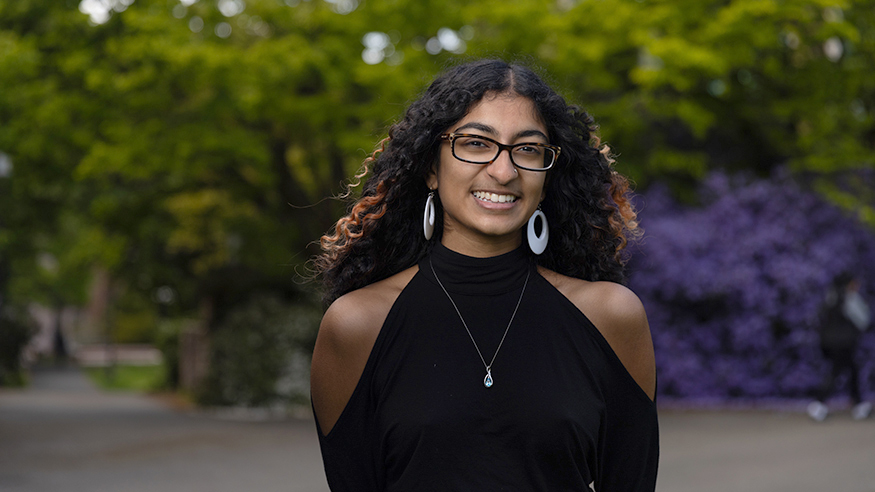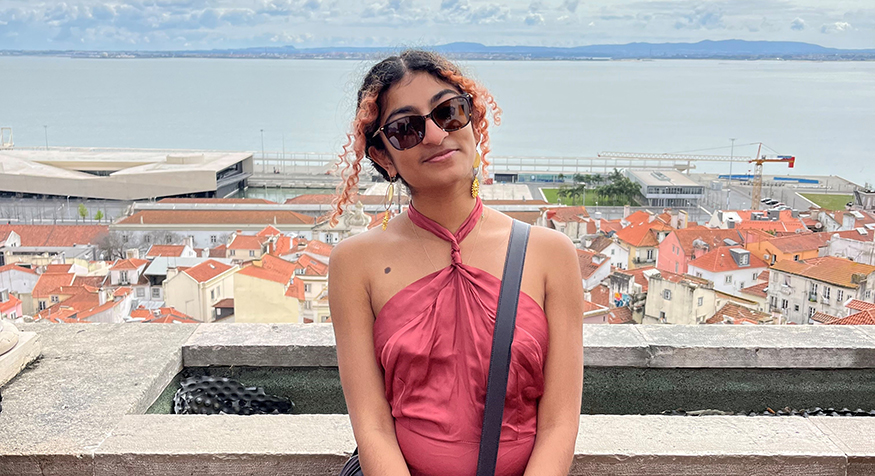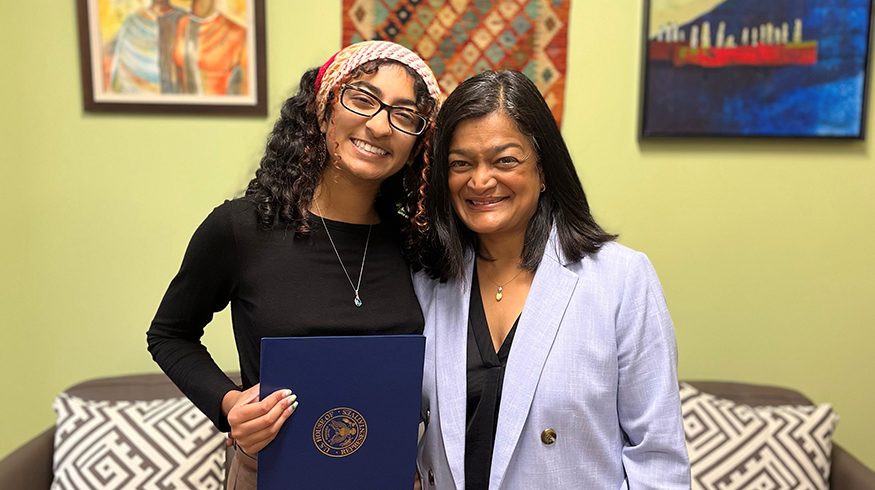
Sana Shetty spent much of her final academic quarter at the University of Washington in court. She was not facing legal troubles; she was an intern with the Gender-Based Violence Unit of the King County Prosecuting Attorney’s Office.
It was the second internship for Shetty, a double major in gender, women & sexuality studies and law, societies & justice and a minor in human rights (all housed in the College of Arts & Sciences).
These and other experiences outside the classroom were as integral to Shetty’s UW education as her academic work, challenging her in ways she was not expecting. She arrived at the UW with plans to become a prosecuting attorney, but experiencing the realities of that work led her to reconsider her plan.
An Early Leap Through Running Start
Shetty, raised in Snoqualmie, Washington, spent her last two years of high school taking community college courses through Running Start, a program that allows high school juniors and seniors to enroll in college courses. She earned an associate’s degree along with her high school diploma.
Having completed general education requirements at community college, Shetty was able to focus on upper-division courses at the UW right away. But arriving at the University with an associate’s degree presented a challenge: she was expected to apply for a major as soon as possible.
Fortunately, Shetty’s interest in human rights quickly led her to the Department of Gender, Women & Sexuality Studies (GWSS) and the Department of Law, Societies & Justice (LSJ). Seeing benefits to each major, she decided to pursue both.
“LSJ and GWSS both do a good job of showing the real-world implications of things,” Shetty says. “GWSS looks at how we understand various rights and who they actually apply to. LSJ asks how those rights are acknowledged in legal systems, or how we should work to have them acknowledged.”
A Quarter in León
Through her LSJ major, Shetty spent a quarter in León, Spain, where the University’s León Center is located. The study abroad program focused on Spanish law in relation to the rights of women and persons with disabilities, which was right up Shetty’s alley.
Being in León, a small city lacking the cosmopolitan atmosphere of Barcelona or Madrid, meant that few people spoke English. That was a plus, because it forced Shetty — who lived with a host family — to speak Spanish all the time. But it also meant that Shetty stood out as a South Asian woman.

“I felt like an alien there,” she recalls. “I’d be on one side of the sidewalk and people on the other side would actively stop walking to watch me go by.”
The first month in León was difficult for Shetty, but her host family was supportive and she found the strength to change her mindset. “Once I realized that I couldn’t change how people looked at me, once I just accepted it and moved on, I was able to really enjoy my experience there,” she says. “That in itself was a learning experience.”
Answers Through Internships
After returning from León, Shetty interned in the office of US Representative Pramila Jayapal. Curious to learn about the intersection of law and politics, Shetty appreciated that Jayapal was a progressive who shares her core beliefs and her South Asian heritage.
Shetty’s primary responsibility was to review letters, emails, and voicemails from constituents and summarize their concerns in an Excel spreadsheet, to be shared with the congresswoman each week.
“It was a cool experience,” Shetty says. “I got a really good sense of people’s concerns and the overall opinions of the population. And I made connections with people who worked there. But what I took away from that internship is that I don’t want to work in politics. That’s not the best place to enact the level of change I want to work toward.”

Shetty’s second internship, at the Gender-Based Violence and Prevention Division - King County Prosecuting Attorney’s Office, allowed her to see firsthand how issues discussed in her GWSS courses played out in the world. The unit’s cases include domestic violence, sexual assault, firearms, and child abuse.
Shetty assisted all attorneys and paralegals within the Gender-Based Violence and Prevention Division, helping with a range of tasks to support their work. She also met one-on-one with nearly a dozen attorneys to learn about their experience working in the unit. “I found it valuable to talk to people who went through a lot of the same dilemmas I’m going through as a 21-year-old thinking about law school,” she says.
I found it valuable to talk to people who went through a lot of the same dilemmas I’m going through as a 21-year-old thinking about law school.
What became clear from her own observations and her conversations with attorneys was the toll of the emotionally charged cases handled by the unit. “It’s really intense stuff,” Shetty says. “It’s ridiculously heavy. A lot of the lawyers told me, ‘If you want to do this line of work, you have to have a support system. You have to be able to keep some things with you and just put some things away.’ It made me question whether I really wanted to go to law school.”
Shetty did decide to apply to law school. She now hopes to pursue legal work related to human rights, “but possibly not direct trial attorney work, now that I have seen the reality of how heavy being a trial attorney can be,” she says. Whatever her future career, she feels her time at the UW prepared her well.
“At the UW, I got to be in classes with students who were as passionate as I am about what they want to do, thinking about how we can take what we’ve learned into the real world to do something useful,” Shetty says. “I believe the things I’ve learned apply to any career you could pursue, to make it more equitable and accessible.”
More Stories

AI in the Classroom? For Faculty, It's Complicated
Three College of Arts & Sciences professors discuss the impact of AI on their teaching and on student learning. The consensus? It’s complicated.

What Students Really Think about AI
Arts & Sciences weigh in on their own use of AI and what they see as the benefits and drawbacks of AI use in undergraduate education more broadly.

A Love of Classics and Ballroom
Michael Seguin studied Classics at the UW and now owns Baltimore's Mobtown Ballroom. The two interests, he says, are more connected than they might seem.
